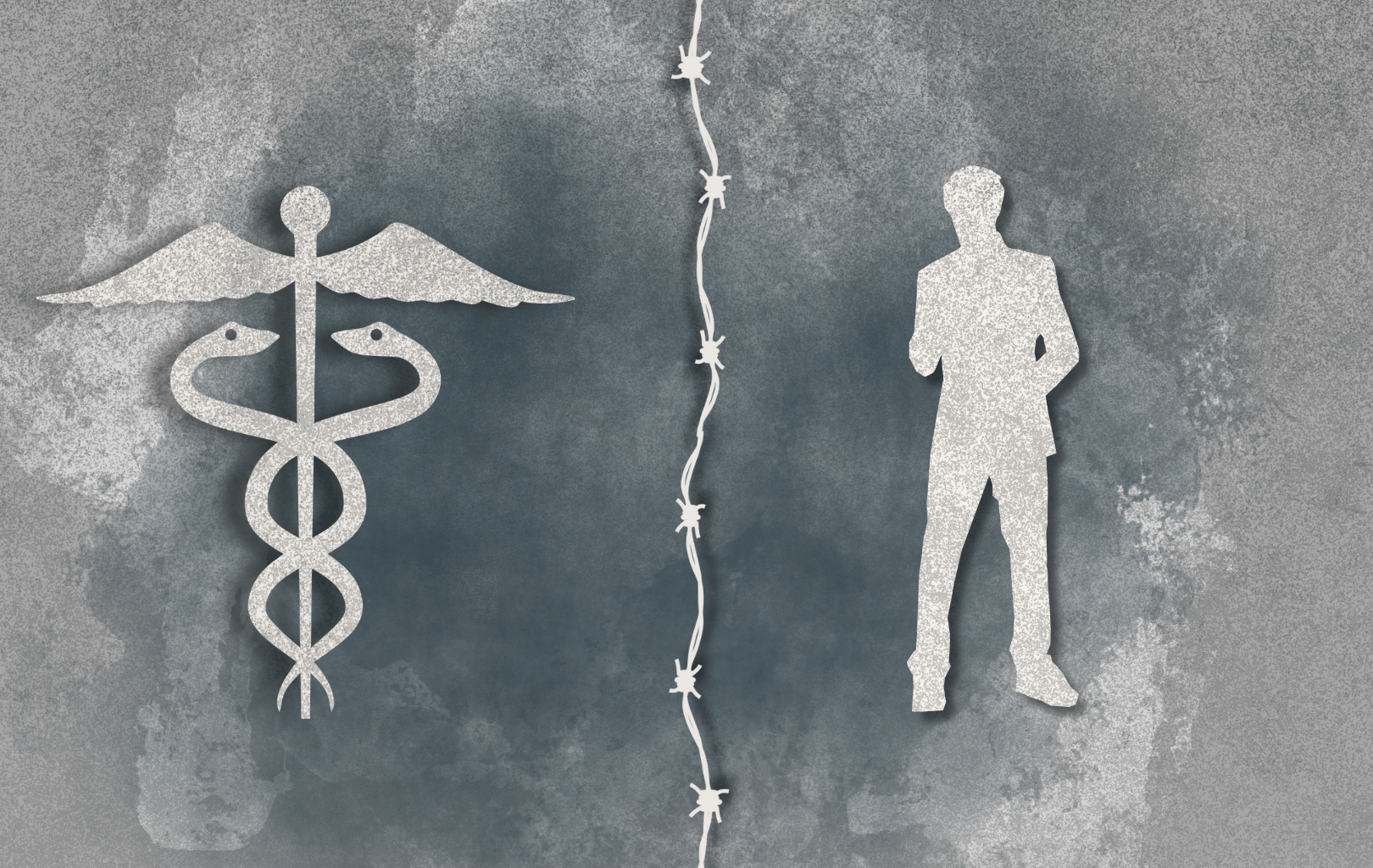She’ll be pumping gas or buying groceries, at a community or other sundry event, doing everyday things. A person in the near distance recognizes her and calls out.
“Nurse … ”
The person approaches, leaning in to make an urgent ask. “You know where I can get some help? ”
Get more stories like this in your inbox every Wednesday in The Weekly.
Subscribe to MLK50’s newsletter
and get Memphis-rooted news and insights
right-sized for your neighborhood.
The need might be a medication the nurse dispensed to that now former inmate, usually a Black man, while he was behind bars. It might be a referral to a local doctor who doesn’t shun patients with a criminal record. It could be something else entirely.
“A lot of them aren’t sent home [from incarceration] with a good supply of what they need. I’ve seen people with chronic asthma leave without an inhaler that will last them a while,” said the Shelby County Jail nurse, who asked to go unnamed because she wasn’t authorized to speak by jail officials.
Over the years, she’s fielded plenty of despairing, impromptu questions from formerly incarcerated people she’s cared for inside juvenile and adult prisons across Tennessee. The jail’s health services are provided by Wellpath, a private company that finished a Chapter 11 bankruptcy restructuring last month. (Neither Shelby County Department of Corrections nor Tennessee Department of Correction spokespeople responded to MLK50’s interview requests.)
Once they leave incarceration, an untold number of those formerly incarcerated face multiple barriers to accessing health care, even though research suggests that untreated health conditions and poor health raise their risks of reoffending and being reincarcerated. One obstacle is Tennessee lawmakers’ decision to forgo federal dollars to expand Medicaid to more low-income adults via the 2010 Affordable Care Act. That means some formerly incarcerated people wind up among the 10% of all Tennesseans without medical insurance.
And while state law requires correctional care clinicians to give released inmates an individualized plan for obtaining health care on the outside, following that plan can be tough.
Disproportionately, people who are formerly incarcerated are jobless, lack steady jobs or perform low-wage work. They are more likely to be uninsured and less likely to have consistent health coverage than people who haven’t been incarcerated. Signing up for even subsidized health insurance from Obamacare’s Health Insurance Marketplace takes some savvy and, frequently, dollars. A nationwide shortage of physicians prolongs the time it takes for former prisoners, like hordes of other patients, to get an appointment with a specialist in asthma, hepatitis, HIV, type 2 diabetes and mental health problems like depression and bipolar disorder. Rates of those illnesses are higher among those who cycle through prisons and jails than among the general public.
The barriers, taken together, can be exacting.
Which is why formerly incarcerated people seek the nurse’s aid.
“I see inmates out in the community regularly,” she added. “Depending on what they say to me, I’ll Google something right there on the spot. I may send them to Christ Community [Health Services] to get help. If it’s really bad, I send them to the ER. I’ve had to say, ‘I’m sorry I can’t help you in the right way out here.’”
A ‘patchwork’ of care, in and out of prison
Three toes on Leonard Love’s left foot were amputated weeks after he was released from the Federal Correctional Institute in Memphis in January 2024.
“I cried,” said Love, 49, a certified HVAC technician and author. “In February, they cut off one toe. In April, they took two.”
A prison doctor diagnosed Love with diabetes during the 17th of his 25 years of incarceration for drug-related crimes. Prison health workers helped him manage his illness reasonably well. But, at the halfway house he moved into after leaving prison, things got out of whack.
“I was eating out of their vending machines. Hoagies and pizza … I had to beg them for a good, diabetic snack, like an apple. And I’m telling them that my blood sugars were erratic,” said Love, tracing his path to becoming an amputee.
 Portia Moore (left) is the founder and CEO of Memphis’ Transitional Reentry Adult Program. Photo by Ziggy Mack for MLK50
Portia Moore (left) is the founder and CEO of Memphis’ Transitional Reentry Adult Program. Photo by Ziggy Mack for MLK50
“The health care he got on the outside was way worse than what he’d gotten in prison,” said Portia Moore, the formerly incarcerated founder and CEO of Memphis’ Transitional Reentry Adult Program.
She’d picked up Love from a Memphis bus station the day he was released from incarceration and helped arrange for him to return to his native Ohio. In Memphis, Moore works with a former federal prison warden and others to help people once imprisoned secure basic, no-frills insurance on the Obamacare marketplace for free, initially. Within 120 days, they must prove they’re working or otherwise can pay a portion of coverage costs.
Two of DeWayne Hendrix’s three brothers served time in prison, said Hendrix, who retired in 2023 after being warden at several facilities. The nearest was in Forrest City, Arkansas, 47 miles west of Memphis.
“I already knew firsthand how incarceration impacts families,” said Hendrix, also a former federal probation and parole manager. “One of the policies I really didn’t like is that, when people were released, we’d give them 90 days of medication and, say, ‘Good luck.’
 DeWayne Hendrix talks about his experience at T.R.A.P. Memphis in January. Photo by Ziggy Mack for MLK50
DeWayne Hendrix talks about his experience at T.R.A.P. Memphis in January. Photo by Ziggy Mack for MLK50
“If they weren’t on Medicaid, after 90 days, if they were insulin dependent or had cancer or any other chronic disease … if they didn’t get a job with benefits to help pay for their coverage, a lot of people would deliberately go do a crime. People shouldn’t have to choose between coming home and being free or getting health care in a prison or jail.”
Indeed, for those involved in the criminal justice system, wellness is vital to not recidivating. Yet, housing, education and employment services for formerly incarcerated people are what reentry programs typically offer. If mentioned at all on websites, in mission statements or other informational material about reentry efforts, health services are further down the list.
In part, that reflects an absence of uniform health policy and health care for formerly imprisoned people nationwide. “It’s a real patchwork,” said Marc Levin, chief policy counsel for the nonpartisan, Washington, D.C.-based Council on Criminal Justice.
Levin, in 2010, founded the Texas Public Policy Foundation’s Right on Crime, a national, data-driven, conservative criminal justice reform project that had drawn a level of bipartisan political support that is rarer these days. Health care for current and former incarcerated individuals has been a focus of those reforms, ones proposed and ones enacted.
“There’s a whole lot to unpack on this subject,” Levin said of post-prison health care. “People come into the local jail [pretrial] often with a lot of health problems … If you’re detained in the jail for a considerable period before you go to state prison, then there’s the whole question of whether your medical records are transferred.
“As it relates to medications, theoretically, the jail should find out what medications they’ve been prescribed and are taking. But, a lot of times, the formularies are different in the jail than in the prison; they may not be an exact match.
“The whole issue of continuity of care — during incarceration and after — is a really important one.”
Most people in prison do go home again. Yearly, more than 600,000 are released from prisons. More than 6 million are released from jails, where roughly 70% of detainees are awaiting trial. In addition to providing an ongoing health care plan for those being released, it’s considered a medical best practice to give them a 30-day supply of medications they were taking while in a correctional facility.
“It’s going to take at least that much, especially when you don’t even have a place to live,” Levin said. “In some cases, you’re dealing with transportation, not having a car. Some people are released from prison without even a photo ID.”
In Memphis, a reentry health partnership
In November 2023, the faith-based nonprofit HopeWorks Prison & Reentry Services sent the first of what, thus far, have been 23 formerly incarcerated individuals for a free pre-employment medical exam and ongoing free or discounted care at Church Health. None of the 23 were medically insured.
HopeWorks’ partnership with Church Health and its longer-standing collaboration with Alliance Healthcare Services’ mental health clinicians stem from an increasing recognition that being in poor health raises the risk of a return to criminal acts. That’s particularly true for those with either mental illness or substance use disorders and those with co-occurring mental and substance use disorders.
The partnerships with Church Health and Alliance are key additions to HopeWorks’ 9-year-old program of providing basic education, technical and vocational skills training, and personal and career development for incarcerated individuals at Shelby County Department of Corrections, said Sharon Billups, HopeWorks director of case management. And as communications between HopeWorks and the corrections agency are improving, fewer people are leaving that prison without at least a 30-day supply of medication, Billups said.
“The goal is for them to get out with a prescription. Sometimes that may not always happen. I don’t know the exact reasons why,” added Billups, who’s been at HopeWorks for almost seven years. “But, now, if I call and say, ‘Hey, this person didn’t get his medicine,’ they jump right on it and get it done.”
While most formerly incarcerated people see the need to keep chronic physical illnesses in check, many resist the reality that they’re also ailing mentally. “They only relate mental health to, ‘Oh, I’m crazy. Something is really wrong with me,’” Billups said. “We really have to educate them and let them know, ‘No, you’re not crazy. You just have an imbalance … This medicine will help balance you and help you cope and help you stay stable, so that you can have a normal life.’”
 A view of the jail at the Shelby County Criminal Justice Center in downtown Memphis. Photo by Andrea Morales for MLK50
A view of the jail at the Shelby County Criminal Justice Center in downtown Memphis. Photo by Andrea Morales for MLK50
Reentry is a much greater undertaking for some formerly incarcerated people than for others, said Memphian Claude Haygood, 65.
He was 18 when he was locked up the first time. The last of his three stints in federal prison for drug trafficking lasted 17 years. While behind bars, he got certified as a personal trainer and, during prison wellness fairs, was assigned to take his fellow inmates’ vitals, measuring their body fat and so on.
Health is inherently embattled behind bars. For one, there are so many infectious illnesses in such close, shared space, he said.
It takes effort, he added, to eat nutritiously in prison. “Some old laws are still on the books, saying they don’t have to serve an inmate nothing but bread and water,” he said. “Now, actually, they have to prepare a meal that is considered a healthy diet within that institution, though they can overstep the rules and reins of that. Like, give you cake and other stuff.
“I’d say 60% of the time you’re being well fed. The rest of the time? You’ve got to make some conscious decisions about what you put in your body.”
Dr. Joel Finley, one of two Church Health physicians treating HopeWorks’ clients, said he doesn’t ask them about their incarceration unless the question is directly related to a health condition. “As far as I’m concerned, they’ve been rehabilitated. From what they tell me, they’re just glad to be free.”
Freedom, though, is a relative thing, Finley suggested, especially for patients trying to navigate a system optimized for those with better health, reliable health insurance and a certain fortitude.
“What happens if you need subspecialty care? If some of those diagnoses are particularly complex, and you need follow-up imaging or maintenance? Every layer of that just gets more and more difficult.”
‘Poor’ treatment and court-ordered care improvements
Incarcerated people are the only U.S. population with a constitutional right to health care. It’s rooted in the Eighth Amendment’s ban on “cruel and unusual punishment.”
But longstanding underfunding of health care in prisons, jails and reentry has made a mockery of that right, critics contend. And when care inside prison is subpar, incarcerated individuals are put on a trajectory of bad health that stretches beyond their release, argue advocates, including those who’ve sued on their behalf.
“Cut-rate care: The systemic barriers shaping ‘healthcare’ behind bars,” a February 2025 report from the Prison Policy Initiative, concluded that correctional officials generally were more concerned with curbing the costs of care than the health of those incarcerated. “With prison healthcare, you regularly see that incarcerated people’s complaints get ignored, their requests for exams get denied, and their care gets slow-walked,” author Brian Nam-Sonenstein, the institute’s senior editor and researcher, said, according to a press release.
Since 2000, courts have issued 52 orders for correctional facilities across 26 states to improve care, according to Nam-Sonenstein’s analysis.
In 2019, the Tennessee Department of Correction promised to improve its testing and treatment of inmates with hepatitis C — one of the nation’s deadliest infectious diseases — after a federal judge decried the department’s protocols as “erratic, uneven, and poor, resulting in denial of … treatment where it was clearly appropriate.” The same judge’s ruling dismissed a 2016 federal class-action lawsuit filed on inmates’ behalf by the American Civil Liberties Union of Tennessee, Disability Rights Tennessee and a private law firm. In May 2016, eight of the 3,487 Tennessee prisoners diagnosed with hepatitis C were getting treatment for it. Thousands more were estimated to be infected but not treated for the disease, which can cause chronic liver problems and liver cancer.
“When folks are reentering the community from the prison system, their death rates are higher than other folks. A lot of that is driven by overdose deaths, or they don’t always access health care services at rates we might want or expect,” said Texas A&M University health policy professor Laura Dague, an associate editor with the Journal of Health Economics.
Her reentry research includes a study, published in February 2025 in JAMA Open Network and co-authored with analysts from the University of Wisconsin Institute for Research on Poverty, on continuity of care after release and how readily the formerly incarcerated do or don’t get their prescription meds and keep appointments with their medical providers. Even with Medicaid coverage, these researchers concluded, successfully transitioning to care in the community is challenging.
“We’ve got to develop policy,” Dague continued, “that strengthens not only folks’ ability to successfully reenter, but also supports the communities that they’re reentering, where there might be potential for spillover consequences of their reentry.”
“Bad things do roll downhill,” said Dr. Josiah Rich, co-founder of the Center for Health and Justice Transformation at Brown University and a former prison doctor at the Rhode Island Department of Corrections. “As a society, we’ve bought into this idea that we don’t have to do too much for prisoners. It seems sometimes that we just don’t care.”
TennCare pre-release medical plans for juveniles, but not adult prisoners
Psychotherapist Brenita Seay, in 2019, switched from counseling young people in high- and low-risk Shelby County juvenile detention facilities to a private practice with child and adult clients who are not justice-involved.
 Seay (center) at T.R.A.P. in January. Photo by Ziggy Mack for MLK50
Seay (center) at T.R.A.P. in January. Photo by Ziggy Mack for MLK50
Counseling juveniles was exhausting. The outcomes were often far from what she’d targeted. One of her favorite clients, a boy, “died. And not by a gun. He’d been in and out of our facility three times. But he died on the street from an overdose,” Seay said. “In the facility, he could be a kid. On the outside, his family life and neighborhood life were just crazy, so much pressure. And none of what we said was designed to help actually worked for him.”
With an eye toward better addressing the physical and mental health needs of incarcerated youth, Washington lawmakers in 2023 mandated all states to do health screenings and assign a case manager to juveniles — defined as those as old as 21 or, in some cases, 26 — who are preparing to be released and to oversee their care for a period post-release.
Targeted case management, as it’s called, for youth and young adults started in January 2025 and is funded through Medicaid and the Children’s Health Insurance Program.
It gives states the option to provide similar case management services before a juvenile’s case goes to trial. But Tennessee lawmakers have not chosen to provide the optional care.
Nor have they applied for a federal waiver to use funds from TennCare, Tennessee’s version of Medicaid, to pay for medical care and planning for up to 90 days before an adult inmate is released. Roughly half the states have received or have pending waivers.
“This is a great start, and it’s only just a start,” said Chad Pendleton, referring to the new health planning for juvenile offenders. “We’re still leaving a huge population of adults out of these important changes.”
Pendleton launched a health care consultancy in Memphis two years ago. He confers with Hendrix, the former warden, about health care for the formerly incarcerated.
“We’ve got to do better programmatically as a state and across the country,” the Memphis native said. “These services guard against the very things we are trying to reform, to keep people from doing. Yet, if they have [a serious mental illness] or other chronic disease and we are not ensuring they have the proper care, the prescriptions … we are setting ourselves up for this revolving door.”
Health and criminal justice journalist Katti Gray’s news coverage has appeared on ABC.com, CBS.com, and in The Guardian US, the Los Angeles Times, Newsday, Reuters, The Washington Post and other publications.
This story is part of “Uninsured in America,” a project led by Public Health Watch that focuses on life in America’s health coverage gap and the 10 states that haven’t expanded Medicaid under the Affordable Care Act.
This story is brought to you by MLK50: Justice Through Journalism, a nonprofit newsroom focused on poverty, power and policy in Memphis. Support independent journalism by making a tax-deductible donation today. MLK50 is also supported by these generous donors.
Got a story idea, a tip or feedback? Send an email to info@mlk50.com.
Related
